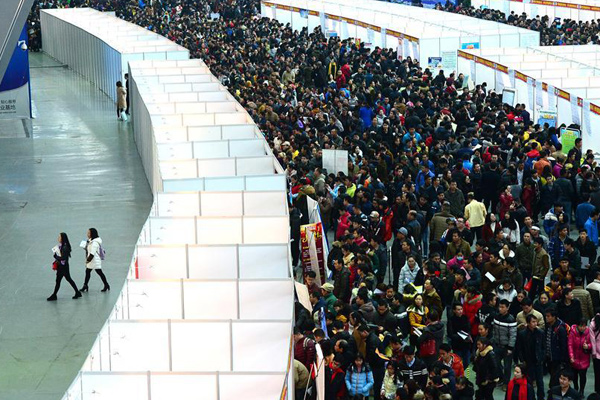Labor shortages, rising rents, falling sales

Nation's entrepreneurial hub finds it hard to adapt to changing business conditions
It's early afternoon. The weather is getting warmer. The dusty roads in the shoemaking capital of China are empty except for a few teenagers in bizarre hairstyles and gaudy attire that make them look more like punk rockers than, well, jobseekers.
They aren't looking for jobs at nightclubs. There are none in this neighborhood of factories and more factories making shoes by the million.
A few years ago, such unconventional teenagers wouldn't have stood a chance of landing a job in any factory here. They probably wouldn't even have got past the gate.
But times have changed. Employers have not become more tolerant, but are faced with the big problem of finding enough people to work for them.
The labor shortage is troubling factory owners in industrialized coastal regions from Tianjin to Foshan in Guangdong province. But the problem is hitting Wenzhou particularly hard simply because of the harsh working conditions in many factories churning out copious quantities of small goods and selling them to overseas buyers at razor-thin profit margins.
As Zhou Haifan, a director of Juyi Group, a well-known shoemaker in Wenzhou, has learned, there is a limit to how far you can cut your costs to survive. Business has been bad in the past few years. To compete for those dwindling overseas orders, Juyi has had to keep trimming its costs to the point that it can no longer afford to keep its experienced workers.
Now "we hire anyone who is willing to work for what we can afford to offer", Zhou said. "Many people who previously worked here did not return after Spring Festival," she said. "Some of them moved to other cities to find work, while others found better opportunities in their hometowns," she added.
A labor shortage is just one symptom of what many economists have predicted: the inexorable decline of the highly labor-intensive industries that earned Wenzhou national fame as an entrepreneurial hub in the past few decades.
But the magic of this town, best known for its hardnosed approach to business, is wearing thin, while its entrepreneurs, sitting on their accumulated wealth, are either jumping ship or seeking to climb the value chain.
Of course, Wenzhou is not all gloom and doom. The city's narrow streets are still jammed with luxury cars and a new mall, which houses some of the world's top fashion brands, opened for business last year.
Luxury car dealers along the airport expressway are still hanging out huge banners to lure big spenders returning from their business trips. Meanwhile, luxury restaurants in downtown Wenzhou, where a meal of seafood delicacies can easily cost in excess of 10,000 yuan ($1,610), are packed with patrons most evenings, and the many agencies offering services to arrange overseas studies for the children of rich families are said to be doing roaring business.
Rapid expansion hurts
But the situation in the city's old factory districts doesn't look so uplifting. In fact, it's downright depressing.
- China to face labor shortage
- Shifting labor, rising incomes spur demand
- Competition, labor costs hurt African profits
- Renault, French unions close to labor deal
- Labor shortage worsens as migrant workers stay hom
- China's labor force drops for first time in 2012
- Labor shortage hits cities as holiday nears
- China to revise labor law























